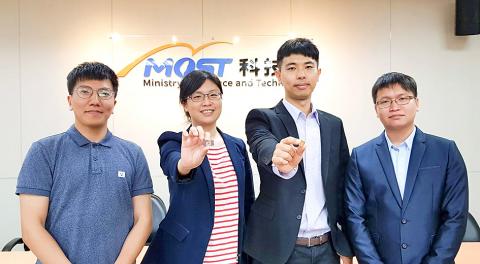A team led by National Cheng Kung University (NCKU) physicists yesterday announced a major breakthrough regarding a next-generation memory storage material that is expected to multiply the efficiency of memory units and pave the way for quantum technology development.
Traditional memory devices process information based on two logic states — zero and one — while their efficiency can be improved only by increasing the density of components and reducing their size, department of physics assistant professor Yang Jan-chi (楊展其) said.
To eliminate the bottleneck in memory development, the team turned to an alternative material — bismuth ferrite (BiFeO3), a material that can record eight logic states and keep the stored information for up to a year even when it is not powered or is heated up to 400°C, Yang said.

Photo: Chien Hui-ju, Taipei Times
The main breakthrough involves controlling the material through laser illumination, which helps reduce delays in the reading of data and energy consumption, while boosting calculation efficiency, he said.
No other researchers have attempted to control high-density memory material using optical means, he said.
Yang, 32, is also enrolled in a Ministry of Science and Technology young talent cultivation program.
The development of BiFeO3 largely remains at the level of academic research and the team has found that the light-driven flexoelectric effect is key to its manipulation, professor Chen Yi-chun (陳宜君) said.
As light presents alternating electromagnetic fields, it is seldom used to control the operations of memory materials, she said.
Nonetheless, the team found that the material’s operations could be manipulated when placed on a surface whose strain gradient is slightly altered by illumination, she said.
The findings were detailed in a paper titled “Deterministic optical control of room temperature multiferroicity in BiFeO3 thin films,” published in the journal Nature Materials on May 6.
The team submitted the manuscript in July last year and it was accepted in March, Chen said.
The team expressed gratitude to collaborators at Hsinchu-based National Synchrotron Radiation Research Center and National Chiao Tung University, as well as members from Germany’s Max-Planck Institute for Chemical Physics of Solids, the University of Texas at Arlington and Lawrence Berkeley National Laboratory, and the University of New South Wales.
While more time is needed before the technology becomes commercially applicable, its discovery brings the nation a step closer to quantum computing technology, which would require highly efficient calculating units, NCKU vice president for research and development Hsieh Sun-yuan (謝孫源) said.

‘DENIAL DEFENSE’: The US would increase its military presence with uncrewed ships, and submarines, while boosting defense in the Indo-Pacific, a Pete Hegseth memo said The US is reorienting its military strategy to focus primarily on deterring a potential Chinese invasion of Taiwan, a memo signed by US Secretary of Defense Pete Hegseth showed. The memo also called on Taiwan to increase its defense spending. The document, known as the “Interim National Defense Strategic Guidance,” was distributed this month and detailed the national defense plans of US President Donald Trump’s administration, an article in the Washington Post said on Saturday. It outlines how the US can prepare for a potential war with China and defend itself from threats in the “near abroad,” including Greenland and the Panama

A wild live dugong was found in Taiwan for the first time in 88 years, after it was accidentally caught by a fisher’s net on Tuesday in Yilan County’s Fenniaolin (粉鳥林). This is the first sighting of the species in Taiwan since 1937, having already been considered “extinct” in the country and considered as “vulnerable” by the International Union for Conservation of Nature. A fisher surnamed Chen (陳) went to Fenniaolin to collect the fish in his netting, but instead caught a 3m long, 500kg dugong. The fisher released the animal back into the wild, not realizing it was an endangered species at

The High Prosecutors’ Office yesterday withdrew an appeal against the acquittal of a former bank manager 22 years after his death, marking Taiwan’s first instance of prosecutors rendering posthumous justice to a wrongfully convicted defendant. Chu Ching-en (諸慶恩) — formerly a manager at the Taipei branch of BNP Paribas — was in 1999 accused by Weng Mao-chung (翁茂鍾), then-president of Chia Her Industrial Co, of forging a request for a fixed deposit of US$10 million by I-Hwa Industrial Co, a subsidiary of Chia Her, which was used as collateral. Chu was ruled not guilty in the first trial, but was found guilty

DEADLOCK: As the commission is unable to forum a quorum to review license renewal applications, the channel operators are not at fault and can air past their license date The National Communications Commission (NCC) yesterday said that the Public Television Service (PTS) and 36 other television and radio broadcasters could continue airing, despite the commission’s inability to meet a quorum to review their license renewal applications. The licenses of PTS and the other channels are set to expire between this month and June. The National Communications Commission Organization Act (國家通訊傳播委員會組織法) stipulates that the commission must meet the mandated quorum of four to hold a valid meeting. The seven-member commission currently has only three commissioners. “We have informed the channel operators of the progress we have made in reviewing their license renewal applications, and